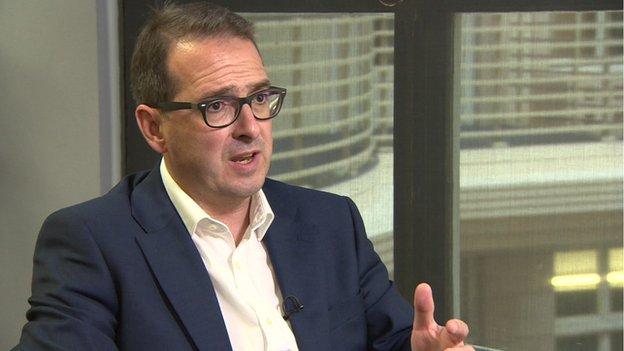Owen Smith on Corbyn, leadership, devolution and Brexit
- Published
- comments

'We've lost credibility, we've lost respect in many of our communities' - Labour leadership contender Owen Smith.
I've been talking to Owen Smith about his challenge for the Labour leadership. Here's a quick summary.
He blamed Jeremy Corbyn for the party's performance in May's assembly elections, said voters backed Brexit because they didn't feel the Labour Party stood up for them, denied that he was anti-devolution and insisted having a prime minister from outside England could help keep the UK together.
I began by asking how he would recover Labour's lost support in the assembly elections, when Labour's share of the vote dipped significantly.
Owen Smith: "Well that dip is largely, I'm afraid to say, because of Jeremy Corbyn. Because we've not been speaking powerfully for Labour in Westminster. Lots of people, you will know, have lost faith and lost hope in Labour. We've lost credibility, we've lost respect in many of our communities, communities that have been traditional Labour-voting areas.
"For us to almost lose Blaenau Gwent, for us to lose the Rhondda, these were hammer blows to the Labour Party and that's something Jeremy Corbyn needed to respond to but he's been poor at taking Labour's case to the Tories in Westminster and he's not been successful in going beyond slogans. So he's talked about being anti-austerity; I agree with him about that. We want a radical Labour government that believes in investing in our communities but it's not enough to just have slogans, you've got to have solutions, and you've got to persuade people that Labour can be a credible government in waiting."
'Brexit'
How would he win over Labour supporters who voted for Brexit?
Owen Smith: "They did it because they felt a sense of loss in their communities, decline, cuts that have hammered away at vital public services and they haven't felt that any politicians, certainly not the politicians they expect to stand up for them, the Labour Party, has been standing up for them. We need to put in place concrete policies that will bring real improvements to people's lives so I'm talking about a British New Deal for every part of Britain, in particular those parts of Britain like urban ex-industrial Wales that has been left behind by recent events."
Some Welsh MPs - and AMs - are sceptical about the former shadow Welsh secretary's commitment to devolution, accusing him of blocking the transfer of further powers during talks that led to the "St David's Day agreement".
'Committed'
Owen Smith: "I think it's totally false and I think it's an impression that Plaid Cymru were quite keen to build up around me as they were trying to drive a wedge between me and Carwyn Jones but Carwyn knows me well and he knows that isn't true.
"I'm a committed devolutionist, I think we need to be extending devolution across England bringing the benefits that we've seen in Wales of power being exercised closer to all those people in England. The difference I suppose that people point to is that I'm also someone who thinks about what it is we want to hold in common as well as what can be devolved and better delivered at a local level. What are the ways in which we want to hold the UK together?"
He added: "So I've said, for example, in the Labour Party the leader of our party in Wales, the first minister, should be much more associated with big decisions being taken in Westminster. I would have Carwyn Jones alongside other leaders from metropolitan bits of England and our leader in Scotland sitting regularly in effectively a regional shadow, a national shadow cabinet to make big decisions to think about defence and economic areas where there isn't responsibility held in Wales but where there is clear interest in Wales or in Scotland in those decisions."
Not surprisingly, Plaid Cymru have questioned his commitment to devolution, citing his failure to vote for the transfer of water, policing and other powers.
'Challenge'
Mr Smith, who had said he wouldn't challenge Jeremy Corbyn, said he changed his mind after a meeting in which the Labour leader failed to offer a concrete plan to unite the party and appeared prepared to see it split.
He disputes the Corbyn version of events, external that he told him he was happy in the shadow cabinet and wanted to stay before resigning. Mr Smith said there were five shadow cabinet members at that meeting and they all backed his account.
Stephen Crabb faced questions during his Conservative leadership bid about whether, in the age of devolution and EVEL, a non-English MP could become prime minister.
'Tragedy'
Not surprisingly, Owen Smith disagrees with those who say MPs from Wales should not be able to decide health and education policy in England.
"We've got more devolution, we are becoming a more federal system in England and Wales and Scotland. We are effectively now a federal country so simply saying you can't be the prime minister if you're anything other than English is completely the wrong direction for us to go in.
"Apart from anything else, wouldn't it be a tragedy if we never had a Welsh man or woman or a Scottish man or woman able to be the prime minister of what is still Great Britain? I'm standing to say, 'I'm a proud Welshman but I'm proudly British as well as being proudly Welsh and I absolutely want to be a leader for Wales and for every other part of the UK'."